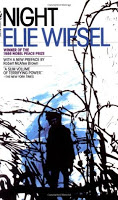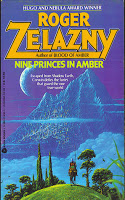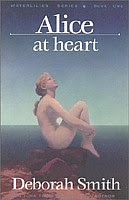I have affiliate relationships with Bookshop.org and Malaprop's Bookstore in beautiful Asheville, NC. I will earn a small commission at no additional cost to you if you purchase merchandise through links on my site. Read more on my affiliate page.
Honestly, I can’t help but feel that for me to sit in judgment of a memoir of the Holocaust would be terribly presumptuous. We can’t ever forget the Holocaust, and any work that reminds us of what happened is important and should be read as widely as possible. The style is a little sparse for me, but do we really need lavish descriptions of crematoriums? I didn’t think so. What is important is that Wiesel laid out his thoughts and feelings for all the world to see, an act of unimaginable courage. It is amazing to me how quickly he and the other prisoners were stripped of their very humanity. It is also amazing how tiny acts of kindness stand out in his memory. But we all know those were too few and far between. Just read this.
Today, April 11, 2010, is Holocaust Remembrance Day.
Six million Jews were killed in WWII. Six million. How do we even begin to wrap our minds around that kind of loss? It’s as if everyone in the cities of Los Angeles and Chicago were gone. No longer there. Because of violence and ignorance and prejudice.
We cannot forget the loss of these people. The Jewish people are the chief mourners, but we should all mourn their loss. The victims weren’t “only” Jews, they were citizens of the world. My world. Your world. Our world. Who knows how things might be different now if such a staggering loss hadn’t occurred then?
Read Elie Wiesel’s 1986 Nobel Peace Prize acceptance speech.
Visit the US Holocaust Museum’s Days of Remembrance page.
Visit the US Holocaust Museum’s Holocaust Encyclopedia.
Here are links to other books I’ve read, both fiction and non-fiction, that focus on the Holocaust.
Maus I: A Survivor’s Tale: My Father Bleeds History
Maus II: A Survivor’s Tale: And Here My Troubles Began Art Spiegelman wrote these graphic novels chronicling his father’s concentration camp experiences. These would be a good introduction to the Holocaust for younger readers. They’re also packaged together as The Complete Maus.
The Hiding Place by Corrie ten Boom–Corrie endured the camps after sheltering Jews. She makes me wonder if I would have that kind of courage.
Sarah’s Key by Tatiana de Rosnay–Tells the little-known story of the Vélodrome d’Hiver, the stadium in France where Jews were held for days and days without food or water before being deported.
The Book Thief by Markus Zusak–My favorite book, period. It’s worth reading for the story of “The Word Shaker” alone.
Those Who Save Us by Jenna Blum–Wasn’t exactly about the Holocaust, but the camps play a huge part in the story.
The Postmistress by Sarah Blake–This isn’t exactly about the Holocaust either, but it shows the early days of the war when Jews were trying to flee and other countries wouldn’t let them in.
I’m currently reading Anne Frank: The Diary of a Young Girl for the first time. Hopefully I’ll have a review up today or tomorrow.
I haven’t read Schindler’s List by Thomas Keneally, but the 1993 Spielberg movie adaptation was powerful. I highly recommend it.
Do you have any recommendations to make or thoughts to share on this topic? Please leave them in the comments.






1 Comment
I read this book in high school and it broke my heart. I've always wanted to read the other two in the trilogy-Dawn and Day but have never gotten around to it.